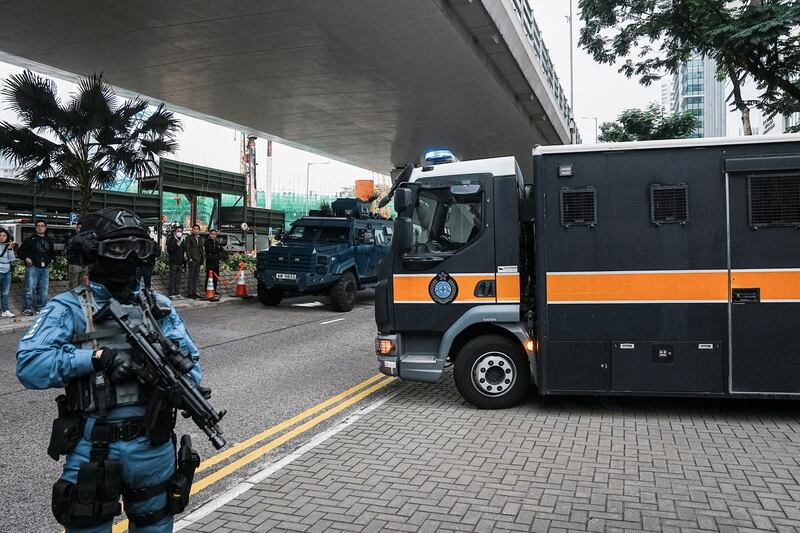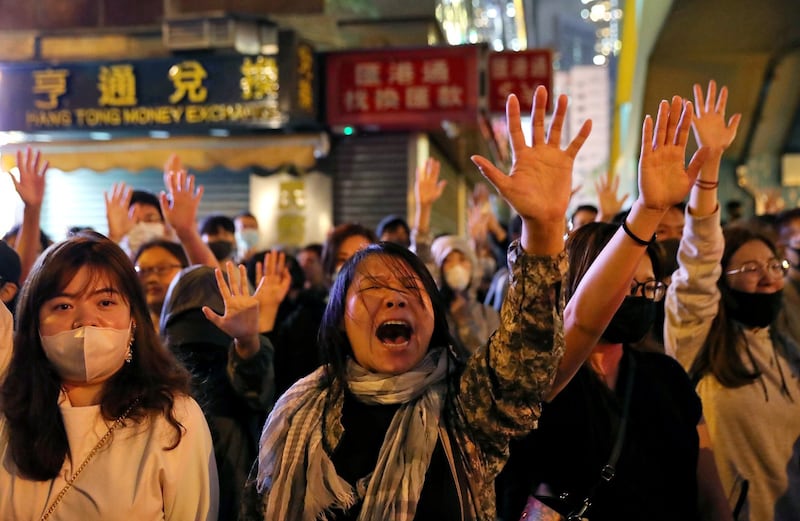Hong Kong has plummeted in the Cato Institute's Human Freedom Index, with the annual rights report describing China's crackdown in the city as a "descent into tyranny."
The city – once ranked in the top 10 freest territories in the world – dropped from 3rd place in 2010 to 46th place in 2021 out of 165 countries, the Cato Institute said in its 2023 report. It fell 17 spots from 2020.
"The territory was once one of the freest places in the world, but the Chinese Communist Party’s escalating violations of Hong Kong’s traditional liberties have caused its ranking ... to fall," the report said, blaming Beijing's imposition of a draconian security law and its subsequent "aggressive takeover of Hong Kong."
"Hong Kong’s descent into tyranny is a tragedy," it said, adding that the city would have fallen still further down the index if it weren't for the global loss of freedoms recorded during the early years of the COVID-19 pandemic.
The report, which comes amid international condemnation over the ongoing national security trial of pro-democracy media magnate Jimmy Lai, found "notable deterioration" in nearly every kind of freedom, but particularly in its rule of law, freedom of expression, and freedom of association and assembly ratings.
The Washington-based Cato Institute is known to embrace a libertarian philosophy. Its mission “is to originate, disseminate, and advance solutions based on the principles of individual liberty, limited government, free markets, and peace,” its website says.
Promised freedoms
Hong Kong was promised the continuation of its rights and freedoms for 50 years following the 1997 handover to Chinese rule, and the 2020 national security law marked the acceleration of direct control from Beijing in the wake of the 2019 pro-democracy movement.
The city's ranking in freedom of expression fell from 50th in 2000 to 110th in 2021, while its freedoms of association and assembly fell from 75th to 146th over the same period, the report said.

While concluding that the current situation has effectively ended the city's autonomy, the report authors kept Hong Kong's scores separate from the rest of China – which rose two spots to 149th – to record the city's trajectory into "subjugation to Chinese Communist Party rule."
"Given ongoing attacks on freedom in Hong Kong, we will be surprised if future reports do not show a continuing and pronounced degradation in the territory’s ratings, including a noticeable decline in economic freedom," the report said.
Lai's trial for "collusion with foreign forces" and "seditious" publications is taking place before a panel of government-appointment judges and no jury, and centers on opinion articles published in his now-defunct Apple Daily newspaper.
Lai has been an outspoken supporter of the pro-democracy movement, and several editors at his former paper are also awaiting sentencing for calling for international sanctions in columns and opinion pieces.
Judges will rule later this week on whether to drop the "sedition" charge, which Lai's lawyers say has passed the time limit for prosecution.
Banned anthem
Meanwhile, the Hong Kong government is stepping up its legal campaign for an injunction against the public playing or dissemination of "Glory to Hong Kong," the banned anthem of the 2019 protest movement, with its lawyers arguing in court on Tuesday that "music can be used as a weapon."
"Political propaganda can make citizens distrust and oppose the government, and even make people hate the government, triggering serious social unrest and chaos," Senior Counsel Benjamin Yu told the Court of Appeal.
The government quoted an interview with the songwriter, who said "music is the most powerful weapon to unite people," claiming that it could be used to overthrow the government.

Earlier attempts to win an injunction were rejected due to the potential "chilling effect" on freedom of expression, and caused a global spike in downloads of the song.
If the court injunction is granted, it will outlaw the broadcasting, performing, publishing or other dissemination of the song on any platform, especially with "seditious" or "pro-independence" intent, the government has said.
It will also become harder to track down the song online, as global platforms could seek to conform with the ruling simply by taking it down.
The anthem was regularly sung by crowds of unarmed protesters during the 2019 protest movement, which ranged from peaceful demonstrations for full democracy to intermittent, pitched battles between “front-line” protesters and armed riot police.
It calls for freedom and democracy rather than independence, but was nonetheless deemed in breach of the national security law due to its "separatist" intent, according to officials.
Translated by Luisetta Mudie. Edited by Malcolm Foster.
